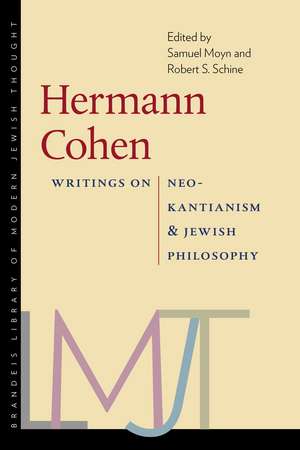Hermann Cohen: Writings on Neo-Kantianism and Jewish Philosophy: Brandeis Library of Modern Jewish Thought
Editat de Samuel Moyn, Robert S. Schineen Limba Engleză Paperback – 14 iul 2021
Preț: 153.71 lei
Preț vechi: 185.51 lei
-17% Nou
Puncte Express: 231
Preț estimativ în valută:
29.41€ • 30.79$ • 24.34£
29.41€ • 30.79$ • 24.34£
Carte indisponibilă temporar
Doresc să fiu notificat când acest titlu va fi disponibil:
Se trimite...
Preluare comenzi: 021 569.72.76
Specificații
ISBN-13: 9781684580439
ISBN-10: 1684580439
Pagini: 275
Dimensiuni: 152 x 229 x 25 mm
Greutate: 0.44 kg
Editura: Brandeis University Press
Colecția Brandeis University Press
Seria Brandeis Library of Modern Jewish Thought
ISBN-10: 1684580439
Pagini: 275
Dimensiuni: 152 x 229 x 25 mm
Greutate: 0.44 kg
Editura: Brandeis University Press
Colecția Brandeis University Press
Seria Brandeis Library of Modern Jewish Thought
Notă biografică
Samuel Moyn is the Henry R. Luce Professor of Jurisprudence at Yale Law School and professor of history at Yale University. He is the author of numerous books, includingNot Enough: Human Rights in an Unequal World and A Holocaust Controversy: The Treblinka Affair in Postwar France. Robert S. Schine is the Curt C. and Else Silberman Professor of Jewish Studies at Middlebury College. He is the author ofHermann Cohen: Spinoza on State and Religion, Judaism and Christianity, an annotated translation, with introduction, of Cohen’s 1915 essay.
Cuprins
Introduction, Note on Translation, Part 1: The Ethics of Pure Will, Introduction, God, Part 2: Essays, Internal Connections of Kantian Philosophy to Judaism, The Social Ideal in Plato and the Prophets, The Significance of Judaism for the Religious Progress of Humanity, Autonomy and Freedom, Part 3: Coda, Franz Rosenzweig, “Introduction to Hermann Cohen’s Jewish Writings” (1924), Alexander Altmann, “Hermann Cohen’s Concept of Correlation” (1962), Ernst Cassirer, “Hermann Cohen: Words Spoken at His Grave on April 7, 1919”
Recenzii
“This new collection is a great gift for our time. Hermann Cohen was Germany’s great philosopher of Judaism and champion of Kantian ethics at the turn of the twentieth century. He drew powerful affinities between Kant’s moral philosophy and Jewish ethics, emphasizing how both point towards perpetual peace. In our divided world today, struggling for a universal ethics, Cohen’s writings offer powerful reasons to hope and strive for a world of peace and wellbeing.”
“This superb anthology of texts by and about Hermann Cohen shows how confronting his work is indispensable to understanding still-vital controversies about the heritage of Enlightenment philosophy, the compatibility of Judaism and modernity and the challenge it faced with the rise of existentialism and the "new thinking." This landmark collection, brilliantly introduced and curated by Samuel Moyn and Robert Schine, is more than a sweeping reappraisal of a thinker who both revived Kant's project and modernized Jewish philosophy. It is a timely invitation--even a compelling summons--to pursue a path all but forgotten and yet of paramount importance for our own times."
“It is difficult to overstate the importance of the task undertaken by Moyn and Schine in this book. For the first time ever, key chapters in Ethik des reinen Willens are available in English. This volume also collects and translates major essays by Ernst Cassirer, Franz Rosenzweig, and Alexander Altmann that have done so much to shape Cohen’s reception in the twentieth and twenty-first centuries. With expert introductions and annotations, this book will be a landmark event in discussions of Cohen in the English-speaking world.”
“This is the most comprehensive collection of Hermann Cohen’s writings currently available in English. Cohen’s Introduction to the Ethics of Pure Will is a gem in its own right. It brilliantly testifies to the enduring importance of Cohen’s ethics in its relation to religion and to law. The volume also features articles of Cohen on Kant and on the significance of Judaism for the progress of Religion. Cohen’s legacy is attested by Ernst Cassirer in the first place, but also by Franz Rosenzweig, whose famous Introduction to Cohen’s Jewish Writings appears here in full: a translation was long overdue. The volume will undoubtedly become an essential resource for those interested in nineteenth and twentieth century philosophy – and in modern Jewish thought.”






